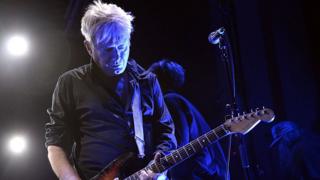This website uses cookies so that we can provide you with the best user experience possible. Cookie information is stored in your browser and performs functions such as recognising you when you return to our website and helping our team to understand which sections of the website you find most interesting and useful.
 Image copyright Getty Images
Image copyright Getty ImagesAndy Gill, the founding member and guitarist of British post-punk band Gang Of Four, has died aged 64.
The musician's scratchy, staccato riffs provided the band with their signature sound, and influenced the likes of Nirvana, Fugazi and Franz Ferdinand.
His bandmates announced his death in a statement, saying: "Our great friend and supreme leader has died today".
Gill had developed a "respiratory illness," after finishing an Asian tour with Gang Of Four last year, they said.
"This pain is the price of extraordinary joy, almost three decades with the best man in the world," wrote his wife, Catherine Mayer, on Twitter.
"Andy's final tour in November was the only way he was ever really going to bow out; with a Stratocaster around his neck, screaming with feedback and deafening the front row," wrote current Gang Of Four members Thomas McNeice, John Sterry and Tobias Humble.
"One of the best to ever do it, his influence on guitar music and the creative process was inspiring for us, as well as everyone who worked alongside him and listened to his music.
"His albums and production work speak for themselves. Go give 'em a spin for him."
Formed in Leeds in 1976, Gang Of Four's career spanned five decades, from their first single Damaged Goods to last year's studio album Happy Now.
In 1979, they made their Top 60 chart debut with At Home He's A Tourist - despite the song being banned by the BBC for a lyrical reference to condoms.
Their debut album Entertainment!, released in September of the same year, has frequently been cited as an influence or inspiration by aspiring musicians, and was named one of Rolling Stone magazine's 500 greatest albums of all time.
Combining Marxist politics with punk, dub, funk and disco, the "stiff, jerky aggression of songs such as Damaged Goods and I Found That Essence Rare invented a new style," the magazine wrote.
'Lightbulb moment'
Gill's unique guitar riffs were choppy and funky with bursts of freeform noise, taking inspiration from a range of players, including Jimi Hendrix, Wilko Johnson and Parliament-Funkadelic's Eddie Hazel.
"Seeing Wilko and Dr Feelgood was a real lightbulb moment," he told The Skinny in 2015. "He never stopped looking at the audience and didn't spend much time looking at his guitar - I duly noted that.
"I always think of the guitar as being part of a larger instrument, which is the band," Gill added. "What I always find uninspiring is when guitarists treat the rest of the band as a background over which they show off."
Gang Of Four never had a hit single (1982's I Love A Man In Uniform came close, before it was banned from the airwaves during the Falklands War) but their first three albums are considered indispensable.
They split in 1984, but reformed several times over the years, with a variety of line-ups. Gill was the only constant throughout their career.
The Manchester-born musician was also a respected producer, working with bands including The Stranglers, Killing Joke, and Red Hot Chili Peppers.
His influence on guitar bands stretched far and wide. REM's Michael Stipe said he "stole a lot" from Gang Of Four, while Flea, bassist for the Chili Peppers, said Gang Of Four were "the first rock band I could truly relate to".
U2's Bono called them "a smart bomb of text"; and Rage Against The Machine's Tom Morello said Gill was "one of my principle influences".
"His jagged plague disco raptor attack industrial funk deconstructed guitar anti-hero sonics and fierce poetic radical intellect were formative for me," he wrote on Instagram.
Gill is survived by his wife Catherine Mayer, his brother Martin and "many family and elective family members who will miss him terribly" said the band in a press statement.
He had just finished a new studio album with Gang Of Four, they added.
Follow us on Facebook, or on Twitter @BBCNewsEnts. If you have a story suggestion email entertainment.news@bbc.co.uk.



 Africana55 Radio
Africana55 Radio 
